by Nivi Jaswal, VLCE
posted Oct 13, 2020
Before Jasmine Leyva, an African American actor and filmmaker, moved to LA, turned vegan, and personally committed to make The Invisible Vegan—before any of that—she was amongst millions of young women of color who struggled to make sense of their emotional relationship with food.
Interviewing for the JIVINITI research program, Jasmine says, “It’s important to have the right role models to convey certain messages to the community. My binge eating in college was rooted in stress and not in any effort to be skinny. I would often purge with laxatives. I did not recognize this as potentially an eating disorder because I did not see black women represented in the context of eating disorders. I had no reference for my own behavior.”
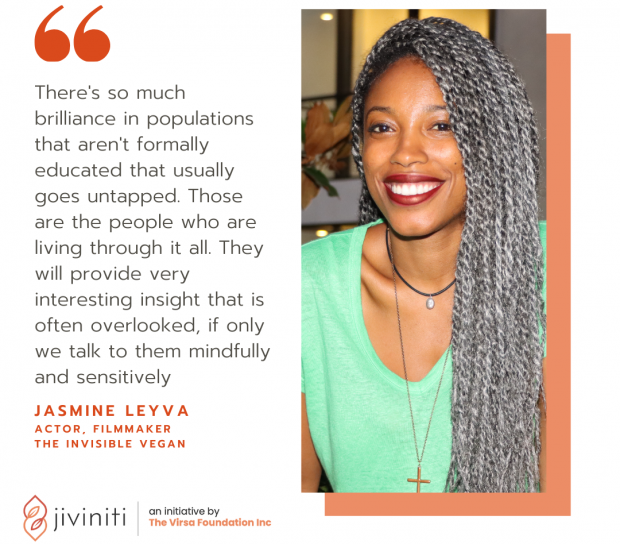
A 2002 study examined whether participants could recognize disturbed eating symptoms in an African American or Hispanic female compared with a Caucasian female by reading a passage about a teenager who displayed such symptoms. The passages differed only regarding the girl’s race. The study found that participants (including minorities) recognized the eating disorder more when they read about a Caucasian girl. These results have implications for public awareness of eating disorders.
Jacque Salomon, a Native American activist in Phoenix, Arizona, says in her interview, “I identify as a colonized woman of indigenous descent. After losing my first-born to an allergic reaction to a pharmaceutical, I needed to understand why dysfunction was so prevalent in our communities but found no evidence-based references that represented us. I found resilience in plant-based eating and that fuels my advocacy.”
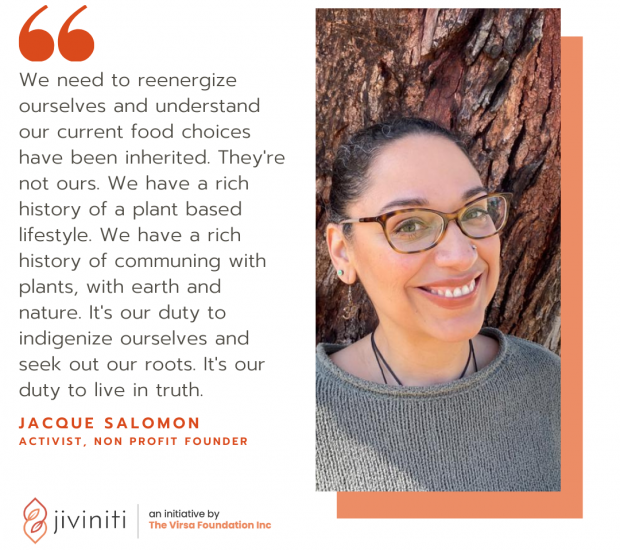
As per American College of Lifestyle Medicine, “Food is Medicine. Choose predominantly whole food plant-based foods that are rich in fiber and nutrient dense. Vegetables, fruits, beans, lentils, whole grains, nuts and seeds.” A USDA study on affordable and nutritious food recommends, on the other hand: “fresh produce, meat, poultry and seafood, as well as more economical package sizes and lower cost store brands and generic brands of packaged foods.”
Angelicia Simmons, an African American lawyer from Raleigh, North Carolina, and Founder of the Fannie Lou Hamer Institute of Advocacy and Social Action, works with Black girls from underserved communities, ensuring they stay in school amid high suspension rates. “My caseload consists primarily of schoolgirls who come from trauma. I’m very concerned with how their nutrition correlates to their emotional health.”
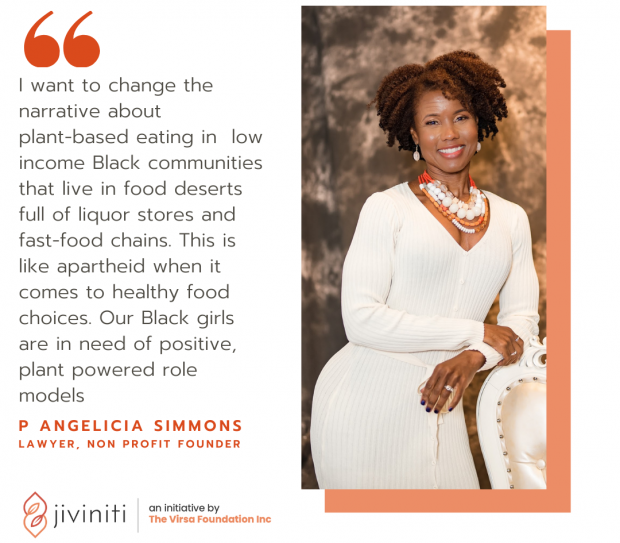
Nutrition insecurity impacts 1 in 3 Americans. The Economic Innovation Group estimates 110 million Americans, mostly persons of color, live in at-risk and distressed zip codes. Ironically, USDA data states that only 19% US households do not have access to “food they claim they want to eat,” concluding 81% households are nutrition-secure.
The connection between what people “claim they want to eat” and if that will ensure nutrition depends on their access to information on healthy food and how that information is conveyed to them. Role models can be very effective in nudging positive behavior change. So also, honest research that gathers insights resulting in solutions that fit the needs of those with whom they are co-created.
Ramona Cadogan, an African American of Caribbean ancestry from New York, is a vegan weightlifter and STEM (Science, Technology, Engineering and Math) educator. She came to fitness through dance, took up weightlifting to show that vegan women can be strong and is training for an international championship in Japan. “I have witnessed how meat and dairy served in school cafeterias translates into chaotic classrooms full of anxious and jittery students with poor emotional coping mechanisms.”
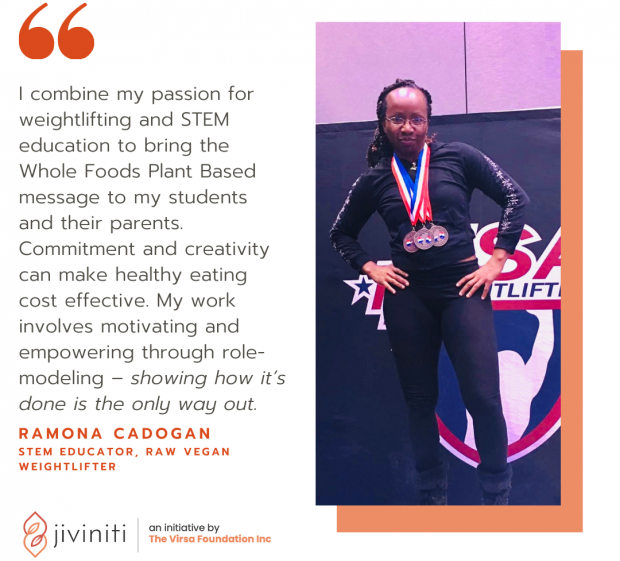
Jasmine Leyva, Jacque Salomon, Angelicia Simmons and Ramona Cadogan are amazing women who overcame struggles and discovered plant powered creative resilience–without access to much reference or role models who could help demystify their personal experience and inspire through concrete example. They are now role models for an entire generation of young women.
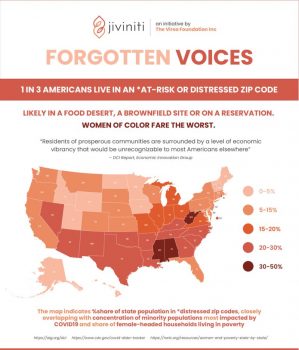
These are excerpts from interviews conducted by the JIVINITI Research Program, a unique multi-stage plant-based ethnographic research initiative which intends to discover the creative voice of women of color in underserved communities. This research will inform a values-driven, racially sensitive plant-based behavior change program and communications design. Please consider a small donation to voice your support for African American (including Caribbean ancestry), Latin American and Native American women, voices that are often forgotten in both clinical and corporate research.
 Nivi Jaswal is a Main Street Vegan Academy graduate and has over 15 years of international corporate experience in brand management and marketing for consumer goods (Unilever), life sciences (Boston Scientific) and the media and research industry (WPP). She has lived and worked in seven different countries and visited 47—and can’t wait to start traveling again once our world is safer! After personally witnessing the power of a whole food, plant-based lifestyle in reversal of chronic illness (in 2018), she started a brand strategy and business consulting practice which is solely focused on vegan nonprofits and for-profits, touching across plant-based nutrition, climate change, lifestyle choices, and sustainability. With a high focus on both client needs and the need for high brand and communication production values, Nivi is highly selective about her projects and works to deliver boutique solutions through an array of corporate professionals, custom picked, and interviewed for project-fit. Nivi also runs The Virsa Foundation Inc., a Massachusetts-based 501c3 non profit, focused on whole food, plant-based lifestyle research programs and intervention for underserved communities, especially women of color, in India (where Nivi is originally from) and USA (her adopted home).
Nivi Jaswal is a Main Street Vegan Academy graduate and has over 15 years of international corporate experience in brand management and marketing for consumer goods (Unilever), life sciences (Boston Scientific) and the media and research industry (WPP). She has lived and worked in seven different countries and visited 47—and can’t wait to start traveling again once our world is safer! After personally witnessing the power of a whole food, plant-based lifestyle in reversal of chronic illness (in 2018), she started a brand strategy and business consulting practice which is solely focused on vegan nonprofits and for-profits, touching across plant-based nutrition, climate change, lifestyle choices, and sustainability. With a high focus on both client needs and the need for high brand and communication production values, Nivi is highly selective about her projects and works to deliver boutique solutions through an array of corporate professionals, custom picked, and interviewed for project-fit. Nivi also runs The Virsa Foundation Inc., a Massachusetts-based 501c3 non profit, focused on whole food, plant-based lifestyle research programs and intervention for underserved communities, especially women of color, in India (where Nivi is originally from) and USA (her adopted home).
Social Media Links:

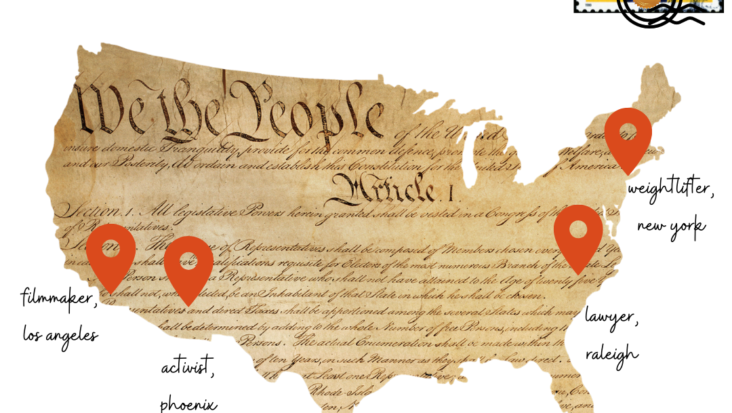
Yes, am interested to connect with the above mentioned women as I see they promote vegansm of which can be shared to our women in kenya.so encourage them to work with us.